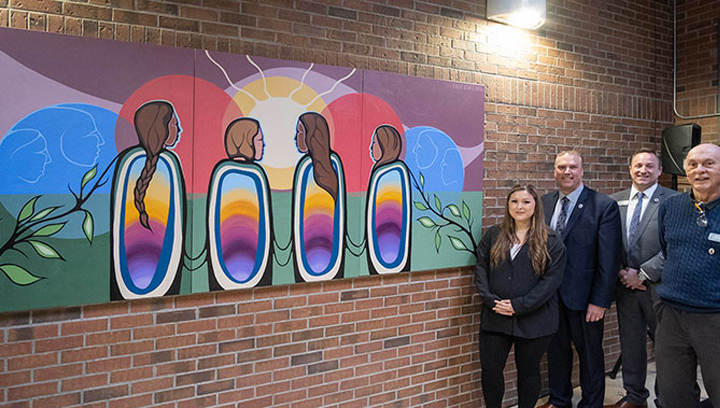
Indigenization
Indigenization refers to the infusion of Indigenous ideas, values, peoples, symbols, esthetics, procedures and an authentic history into an organization so that it is a product of Indigenous imaginations and aspirations. 51╩ėŲĄ has made Indigenization a priority and aims to enrich our college community with as much Indigenous culture and knowledge as possible.
Indigenization in action

New Indigenization Strategy and artwork unveiled at the Owen Sound Campus
┬ĀA new commissioned painting, Across the Horizon, by Anishnaabe artist and visual storyteller Emily Kewageshig was unveiled at the Owen Sound Campus as part of the Indigenous Strategy launch.┬Ā
Anishnaabemowin champions video series
Watch our Anishnaabemowin champions video series to hear from local Anishnaabemowin champions about their Anishnaabemowin journey and the importance of language revitalization.
Indigenization Strategy at 51╩ėŲĄ
Maajiishkaadaa (LetŌĆÖs Move Forward Together)
Our vision for the process of Indigenization at 51╩ėŲĄis threefold
- 51╩ėŲĄwill be a college of choice for First Nations, M├®tis, and Inuit students and other students of Indigenous ancestry.
- Indigenous students will thrive academically and personally throughout their education journey at Georgian.
- 51╩ėŲĄcampuses will be sites of transformative change for individuals where employees and students are empowered to support work related to decolonization, reconciliation, and Indigenization.
Our framework for Indigenization
51╩ėŲĄrecognizes six overarching pillars (strategic priorities) of Indigenization:
- Truth and Reconciliation
- Leadership
- Representation
- Community engagement
- Curriculum and pedagogy
- Cultural enrichment
To learn more about our vision, objectives, action items and success measures, read ŌĆō our guiding document for how weŌĆÖll continue our work of Truth and Reconciliaction over the next two years.
Land acknowledgement
51╩ėŲĄ acknowledges that all campuses are situated on the traditional land of the Anishnaabeg people. The Anishnaabeg include the Odawa, Ojibwe, and Pottawatomi nations, collectively known as the Three Fires Confederacy. 51╩ėŲĄ is dedicated to honouring Indigenous history and culture and committed to moving forward in the spirit of reconciliation and respect with all First Nation, M├®tis and Inuit people.
Watch the video to learn about the origins of this acknowledgement.
Indigenous education protocol
In 2015, 51╩ėŲĄ signed the Colleges and Institutes Canada, Indigenous Education Protocol recognizing and affirming our responsibility and obligation to Indigenous education.
In signing this protocol 51╩ėŲĄagreed to:
- commit to making Indigenous education a priority.
- ensure governance structures recognize and respect Indigenous peoples.
- implement intellectual and cultural traditions of Indigenous peoples through curriculum and learning approaches relevant to learners and communities.
- supporting students and employees to increase understanding and reciprocity among Indigenous and non-Indigenous peoples.
- commit to increasing the number of Indigenous employees with ongoing appointments, throughout the institution, including Indigenous senior administrators.
- establish Indigenous-centred holistic services and learning environments for learner success.
- build relationships and be accountable to Indigenous communities in support of self-determination through education, training, and applied research.

Indigenous Education Excellence Award
51╩ėŲĄis┬Āextremely proud to be the gold winner of the 2022┬Ā, presented by .
The Indigenous Education Excellence Award recognizes a college or institute that has a demonstrated commitment to Indigenous education through innovative approaches and dedicated structures, curriculum, holistic support services and community partnerships that contribute to learner success, as well as socio-economic development and reconciliation within communities.
to learn more about Indigenous initiatives at Georgian, and see the many ways students experience not only academic success, but also personal growth and development for their future lives.
Elders Advisory Circle
The Elders Advisory Circle was founded in 2009 and is an important part of the college community. Indigenous Services holds an Elders Advisory Circle twice a year to share progress and receive advice and insights to better the Indigenous Services offered at 51╩ėŲĄ.
Pictured from left to right are, seated: Shirley John, Emily Norton and Pat Strong. Second row: Pat Whittington, Ernestine Baldwin, Kaila McCormick, Mercedes Jacko, Lorraine McRae, Jennifer Linklater. Back row: Greg McGregor, Terry Sahanatien, Roland St Germain and Verna Porter-Brunelle. Missing: Berdina Johnston , Loretta McDonald, Austen Mixemong

Anishnaabe Education and Training Circle
The Anishinaabe Education and Training Circle (AETC) is a community advisory committee that has undertaken a number of initiatives in partnership with 51╩ėŲĄ since its formation in 1992.
The overall goal of the partnership focuses on increasing the attraction, retention and graduation of students of Indigenous ancestry (First Nations, M├®tis and Inuit) in the post secondary environment.

The AETC is a co-operative initiative among regional Indigenous communities and organizations in the 51╩ėŲĄ catchment area.
The membership currently includes:
- Orillia Native WomenŌĆÖs Group
- Elder representative
- Alumni representative
- Current student representative
- 51╩ėŲĄ representative
- Board of Governors representative
Resources
Indigenization column archive
The following articles were written by GeorgianŌĆÖs Indigenization Specialist:



